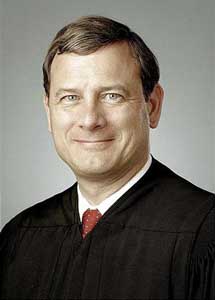-
- Supreme Court confirmation hearings have grown tougher over the years
- Milwaukee Gay Arts Center fights city over nude review
- Anti-gay church protests at funerals, drawing counter-protesters
- Campaigns gear up in fight over Texas same-sex marriage ban
- Two Arkansas disc jockeys plead guilty in gay porn case
- National News Briefs
- World News Briefs
national
Supreme Court confirmation hearings have grown tougher over the years
Pointed questions on specific issues raises concern over what is fair game during hearings
Published Thursday, 01-Sep-2005 in issue 923
WASHINGTON (AP) – When Abraham Lincoln nominated Samuel Freeman Miller to serve on the Supreme Court, an eager Senate approved the Iowa lawyer within half an hour.
When Ulysses Grant tapped former War Secretary Edwin Stanton to fill a vacancy on the high court, the Senate confirmed him one day later.
Pointed questioning of nominees – and their frequent dodging and weaving in response – is a relatively new phenomenon in the confirmation of Supreme Court justices.
Harlan Fisk Stone in 1925 became the first nominee to testify before the Senate Judiciary Committee. It was not until the mid-1950s that the notion of a nominee facing a line of questioners became more typical.
Even in 1986, when Associate Justice William H. Rehnquist was nominated for chief justice, he thought he should not have to appear before the Senate. After all, he reasoned, former Sen. Sherman Minton, whom President Truman nominated for the court in 1949, had refused to appear before the Senate and had been confirmed anyway.
By then, however, it was no dice.
Rehnquist’s elevation to chief justice sparked two weeks of stormy testimony and debate. There was the kind of persistent probing on issues such as civil liberties and the rights of women and minorities that now is standard fare for Supreme Court nominees.
John Roberts, whose confirmation hearings will unfold after Labor Day, knows the drill well. He helped guide Sandra Day O’Connor, whom he hopes to replace on the court, through her own confirmation hearings in the summer of 1981.
His advice, set out in a memo he wrote a few months later, was: “Avoid giving specific responses to any direct questions on legal issues likely to come before the court” while demonstrating “a firm command of the subject area and awareness of the relevant precedents and arguments.”
In the lead-up to Roberts’ hearings, conservatives and liberals are scrutinizing transcripts of hearings past as they jockey for position and try to buttress arguments about what questions are – and are not – fair game.
The 1993 questioning of Ruth Bader Ginsburg provides grist for both sides.
Conservatives, hoping to make it easier for Roberts to duck controversial questions, point to Ginsburg’s frequent demurrals on questions related to specific issues including gay rights, gun control, free speech and school vouchers.
Liberals spotlight the questions she did answer, including ones on abortion and the right to privacy.
Ginsburg at times invoked a ski-slope analogy as she deflected questions. She said she was at the top of the slope and had resisted “descending that slope, because once you ask me about this case, then you will ask me about another case that is over and done, and another case.”
Roberts himself invoked her words when he was up for confirmation to the federal appeals bench in 2003 and wanted to avoid answering certain questions.
John Anthony Maltese, a University of Georgia political scientist who has written a book about Supreme Court nominees, said it was after the court’s Brown v. Board of Education ruling in 1954 striking down school segregation that senators, particularly Southern Democrats, became more interested in questioning nominees about specific issues.
Thurgood Marshall, nominated by President Johnson in 1967 to be the first black justice, ran into particular resistance from Democrats from the Deep South. They attacked “his well-known liberal philosophy and what some regarded as defective legal knowledge,” Henry Abraham wrote in his history of Supreme Court appointments, “Justices, Presidents and Senators.”
“Thus, Senator Thurmond of South Carolina at one point read more than 60 complicated questions, studded with quotes from and about political figures of the 1860s to the nominee during lengthy hearings before the Judiciary Committee,” Abraham wrote.
In the 1980s, President Reagan’s determination to nominate judges and justices of a particularly conservative bent contributed to the Democrats’ interest in more closely questioning nominees, Maltese said.
“They said, ‘If the president can nominate based on ideology, then why can’t we reject on the basis of ideology, and why can’t we ask questions about the ideology of nominees,’” Maltese said.
That, Maltese said, led to more detailed questioning of nominees such as Robert Bork, whose 1987 confirmation hearings turned into a donnybrook that ran to more than 6,000 pages of testimony. Ironically, it was Bork’s willingness to forthrightly answer senators’ questions about his judicial philosophy that helped to do him in.
“There was one person who kind of stood up and was willing to test the standard and it didn’t work out well for him,” said University of Connecticut political scientist David Yalof, author of a book on Supreme Court nominees. “And thus the lesson was learned for all future nominees, and I suspect for John Roberts as well.”
After Bork’s nomination was defeated and a second nominee withdrew, Reagan nominated appellate judge Anthony Kennedy. He gave no clues about how he might rule on issues such as abortion, affirmative action and school prayer during three days of fairly gentle hearings before the Senate committee.
“I have concluded that Anthony Kennedy was being ultra-careful in his testimony, with the entrails of Robert Bork still on the floor and dangling from the chandeliers,” said New Hampshire Republican Gordon Humphrey, who served in the Senate from 1979 to 1990. “I conclude Judge Kennedy didn’t want his guts ripped out by senators on this committee.”
|
|
Copyright © 2003-2025 Uptown Publications


